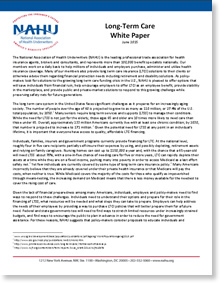 Much of the legacy we leave may be measured by how honestly we’ve dealt with life’s most painful truths. Often, such truths are the most obvious, yet hardest to see clearly.
Much of the legacy we leave may be measured by how honestly we’ve dealt with life’s most painful truths. Often, such truths are the most obvious, yet hardest to see clearly.
I’ve seen a few hundred of my nearly 3,000 clients collect from policies I’ve sold them during the past 25+ years. This is just the tip of the iceberg, however; many more will need to collect from their LTCi as time goes on.
For different reasons, when a parent needs LTC, family members who’ve always gotten along well may find themselves at odds with each other. The absence of sufficient, readily available money to swiftly access long-term care (LTC) aggravates an already highly stressful situation.
What makes things so different for them for those who own LTCi is that their LTCi policies pay out significant, meaningful amounts of money when LTC is needed. This is often a huge game changer. LTCi tends to subdue emotional discord. Relationships don’t suffer as much, and outcomes are better. The money people collect from LTCi provides them with dignity, choices, access, and options they would not have otherwise had.
Sadly, most of us still do not own LTCi. Sadder still, it is too often well-educated people with good incomes and a whole lot to lose who choose to be unprepared for LTC.
Such people come up with what they think are fabulous excuses avoid discussing what might happen to them at the end of their lives. There seems to be a disconnect between our intellect and our emotions when it comes to LTC planning.
According to www.longtermcare.gov and other reputable sources, at age 65, there’s a 70% chance of needing LTC. These odds go up with each year we age. Visit Genworth’s Cost of Care Calculator to see just how expensive LTC is in your locale.
Most LTC in the US is provided on an unpaid basis, disproportionately by women, who often have to sacrifice their careers, savings, and relationships to provide care. LTC already costs American families dearly, yet the worst of this crisis is yet to come.
As former First Lady Rosalynn Carter said, “There are only four kinds of people in this world: those who have been caregivers, those who are caregivers, those who will be caregivers, and those who will need caregivers.”
Major Misconceptions About LTC and LTCi
Here are some simple responses to major misconceptions about LTC and LTCi. More complex answers are found on the Resources or LTCi FAQ pages of this site, or by calling me, at no obligation:
- LTCi is too expensive. Not true. What may be expensive is needing LTC for anything but a short time and not owning LTCi. Policyholders usually collect back all premiums they’ve paid over the life of their policy in a few short months. Premiums are customized for each person and can be made to fit into almost anyone’s budget.
- The government pays for LTC. The type of LTC the government pays for is not what you would freely choose.
- Medicare covers LTC. No it doesn’t! Medicare covers acute medical problems and a restrictive, conditional amount of home or in-patient rehabilitative care that most people don’t qualify for.*
- The LTCi industry is threatened. It’s true that the number of carriers selling LTCi has shrunk; there are valid reasons. Policyholders are not in danger. LTCi carriers remain staunchly committed to the market. They realize the LTC crisis and oncoming Senior Tsunami isn’t going away any time soon, and are in it for the long run.
- LTCi only pays for nursing homes. The opposite is true. The great majority of LTCi policies pay comprehensively, for care at home, in adult day care, assisted living, and nursing homes. They enable you to increase the odds you will not need LTC provided in a nursing home.
Here are some of many silly excuses smart people give me to avoid conversing about LTCi while they’re healthy and can find reasonable premiums:
My wife will take care of me. Really? Your wife will be eager and physically capable of helping you bathe and dress, for example? You don’t mind the thought of her last memories being about the physical, emotional and financial burdens of caring for you?
That won’t happen to me. Really?
My kids will take care of me. Really?
I’ll kill myself.
I can’t afford LTCi. Many people claim LTCi is too expensive, despite the fact that we tailor LTCi premiums to fit into most people’s budgets. Situations like this one happen frequently: an acquaintance tells me she can’t afford LTCi premiums. This person’s mother needed LTC for an extended length of time, at great sacrifice to the family. A week later this person announces she is making a two week trip to Mt. Everest Base Camp/African photo safari/Tahiti or another exotic locale, or is buying a top-of-the-line car/kayak/audio equipment, etc. She has the money to do that but can’t afford LTC premiums. Where’s the disconnect?
Here’s another common scenario: I get incoming calls with Caller ID stating: “METHODIST HOSP RE-HAB”. The caller is the daughter or son of someone who’s just broken their hip or suffered a stroke. They ask me to come sell their parent LTCi. I have the unpleasant task of trying to tactfully explain that their parent is uninsurable. Sometimes the child is incensed by this news. I suggest the child is of ideal age to find reasonably priced LTCi for themselves; this might be a wise idea if they want to assure a similar scenario doesn’t play out when at the end of their lives. The child is normally not interested. The reason is that the family is in the worst kind of turmoil, duress, and dysfunction. They are scurrying around trying to cobble together LTC for their parent, and there isn’t sufficient, readily accessible money to pay for it. This is the scenario Dayna and I urge you to avoid by doing reasonable, responsible LTC planning, now.
What all of my LTCi clients have in common, regardless of their incomes, is the ability to honestly, openly discuss LTC in advance. Most of my clients have had firsthand experiences caring for someone who needed LTC. They’ve learned from them, and taken action to avoid the consequences of not being prepared for their own long-term care.






 Thanks for visiting my site! I like hearing from you!
Thanks for visiting my site! I like hearing from you!